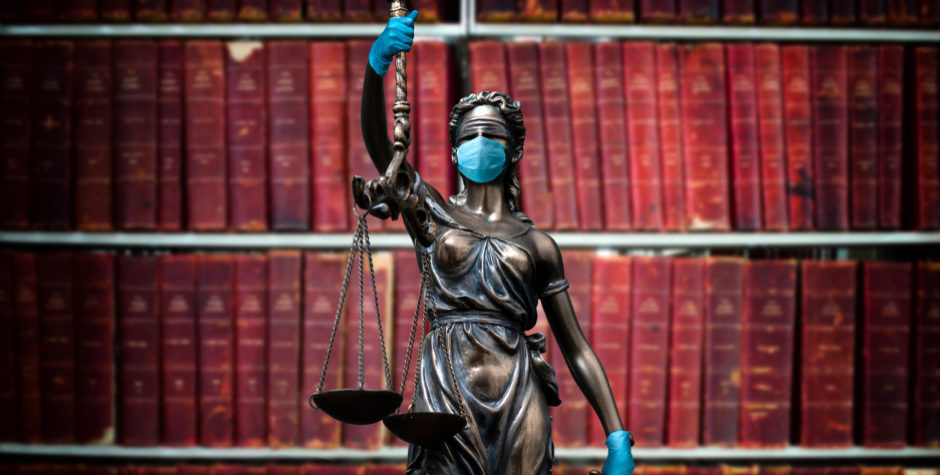Can States and Courts Change Federal Election Voting Rules During A Pandemic?
Numerous questions have arisen regarding whether federal election voting rules could change if the Coronavirus pandemic persists into the fall. Questions have focused on the power of states and judges to unilaterally change either the date or the manner of elections.
First, the date of the federal election is set by statute. Therefore, Congress would need to enact new legislation in order to significantly change to the general election date, which has been fixed as the first Tuesday after Nov. 1 by an act of Congress in 1845. This date cannot be changed by the president, by state election officials, or by judges in the absence of new legislation.
Even though public-health officials may have sweeping emergency authorities to limit gatherings or impose quarantines, it is equally clear that courts have granted strong protections to the rights of citizens to cast a ballot. Hence it becomes extremely doubtful that either the executive or legislative branch of states on the one hand or, state or federal judges on the other hand, have the power to eclipse the rule of law and the Constitution.
Beyond the issue of changing the date of the federal election and consistent with the tenor and tone of rules safeguarding the right of citizens to cast their ballot, both the rule of law and the Constitution also constrain the power of judges and state legislatures to interfere with integrity of the election process. This principle is important in considering a plethora of recent proposals for mail-in and on-line voting, which are quite susceptible to fraud or simple failure to count all the votes. These disturbing problems assume greater prominence in light of the fact that numerous jurisdictions have failed to update their voting rolls in violation of the National Voter Registration Act (NVRA).
The statutory language of the NVRA requires the removal of inactive registrations from voter rolls after two general federal elections because such voters have likely either moved to another county or state or have passed away. A recent signed settlement agreement between the State of California and the County of Los Angeles and Judicial Watch illustrates this problem. The settlement requires the removal of as many as 1.5 million inactive registered names that may be invalid. The Supreme Court recently affirmed in Husted v. A. Philip Randolph Inst., 138 S. Ct. 1833 (2018) that the NVRA “makes this removal mandatory.”
In Purcell v. Gonzales, 549 U. S. 1 (2006) the United States Supreme Court stated that:
A State indisputably has a compelling interest in preserving the integrity of its election process. Eu v. San Francisco County Democratic Central Comm., 489 U.S. 214, 231 (1989). Confidence in the integrity of our electoral processes is essential to the functioning of our participatory democracy. Voter fraud drives honest citizens out of the democratic process and breeds distrust of our government. Voters who fear their legitimate votes will be outweighed by fraudulent ones will feel disenfranchised. ‘[T]he right of suffrage can be denied by a debasement or dilution of the weight of a citizen's vote just as effectively as by wholly prohibiting the free exercise of the franchise.’ Reynolds v. Sims, 377 U.S. 533, 555, (1964).
Consistent with the rule of law and the constitutional focus on election integrity, the Supreme Court has also ruled that when a state sets a particular date—election day—for mailing and postmarking of absentee ballots, lower courts and presumably state officials lack the power to alter the election day. In Republican National Committee, et al./, v. Democratic National Committee et. Al., a case decided on April 6, 2020, the Supreme Court held that extending the date by which ballots may be cast by voters for an additional six days after the scheduled election day fundamentally alters the nature of the election. (We analyzed this decision here.)
More specifically the Supreme Court in Republican National Comm. v. Democratic National Comm. said:
By changing the election rules so close to the election date and by affording relief that the plaintiffs themselves did not ask for in their preliminary injunction motions, the District Court contravened this Court’s precedents and erred by ordering such relief. This Court has repeatedly emphasized that lower federal courts should ordinarily not alter the election rules on the eve of an election. See Purcell v. Gonzalez, 549 U. S. 1 (2006) (per curiam); Frank v. Walker, 574 U. S. 929 (2014); Veasey v. Perry, 574 U. S. __ (2014). The unusual nature of the District Court’s order allowing ballots to be mailed and postmarked after election day is perhaps best demonstrated by the fact that the District Court had to issue a subsequent order enjoining the public release of any election results for six days after election day. In doing so, the District Court in essence enjoined nonparties to this lawsuit. It is highly questionable, moreover, that this attempt to suppress disclosure of the election results for six days after election day would work. And if any information were released during that time, that would gravely affect the integrity of the election process.
In fact, the Court held: “Extending the date by which ballots may be cast by voters — not just received by the municipal clerks but cast by voters — for an additional six days after the scheduled election day fundamentally alters the nature of the election.”
This case and prior Supreme Court precedent emphasize that election integrity matters and election dates and other procedures matter. The Supreme Court continues to uphold the rule of law and the Constitution.
The ACLJ will continue to monitor this situation and, if necessary, where warranted we will intervene to uphold the rules of law and the Constitution in the electoral process.
The American people deserve no less.

